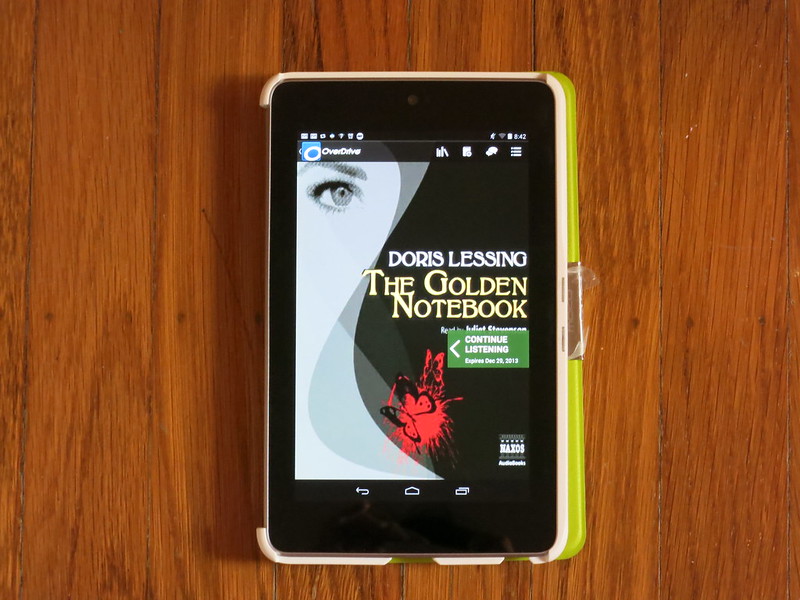
So...I waited until I was reading something blatantly intelligent before before completing this post. There you have it. Doris Lessing's The Golden Notebook, one of the most emotionally taxing, mentally overwhelming, lives-up-to-its-own-legend books I have subjected myself to. Have you ever read a book and thought - "hell, I could've written that." Well, that won't happen here.
That aside, I "read" this on audiobook. Cheating? I don't know. I used to know - I used to have all the answers, but now...I don't know. I've had some truly moving experiences via audiobook, of the same kind that reading a good book will do. That, I have discovered, is not a bad thing. Because the point of a book is to create an experience, and having it read to you, while easier (there is less focus, less concentration involved) will create an authentic experience. It may not be the exact same as hearing that perfect voice in your head, but that doesn't make it any less.
I started this practice, like most things, under duress. Sometimes the library will have an e-copy, sometimes a physical copy, and sometimes an audio copy, but never all of them and never at the same time. Alas. So to continually feed my appetite for that particular novel, I had to compromise, and considering the state of my morals, it wouldn't be the first time.
After compromising myself several times over while listening to books in this inferior format, I began to notice a few things:
The voice is everything. If you do not have a good reader, it will bring a good book to its knees; the experience of a book becomes irrevocably tied to this single voice. In the best case scenario, you will have a full professional cast of actors reading each individual character with symphonic interludes (See: The Golden Compass).* In the worst case, you will be subjected to hours in the company of that nasal twat-sicle that sat behind you in History 1B. Between these two extremes, you simply need to be able to read both genders without sounding whiny and high-pitched (men reading as women) or just plain weird (women reading as men). I have noticed that reading, not acting out characters, may also make the listening experience less offensive while enhancing the listener's enjoyment of the language of the book.
Audiobooks may be better or worse for certain genres. Poetry could really benefit from being heard - you can replay them over and over again like songs, until the rhythm of the words really sinks into your head. On the other hand, I'm not sure if I would want to have certain types of books read to me. I suggest you google Gilbert Gottfried and 50 Shades to see what I mean by this.
Now, here is the crucial question - why would you want to make an audiobook? In my own experience, when I've asked people if they want to take a look at a draft of my book, the answer is almost universally the same - they would love to, but they have no time. This "I have no time" is the most popular rationale that well-meaning people have for not reading anymore. Or for only reading the news, it amounts to the same thing. The book is a monopolizer. You have a carve out a chunk of time to truly experience a novel in the traditional way, and I don't think people will give that kind of time to just anyone. This is where audiobooks come in.
The experience of an audiobook is different than a book, because suddenly - Look! Free hands! Your hands are not tied to a book! And this allows those same hands to do a variety of other things, like wash the dishes, or drive a car, or surf the internet. Yes, the experience of reading this precious book that it took forever to bleed out from the ashes of your heart is being split between a crying baby and road rage. I try not to think about that part. I try to focus on the other part: this may be how you will reach a broader, busier audience, who would otherwise not grant you their time. It's a tactical maneuver. It's your way in. Let me put this another way, if I could pack the experience of my book into a syringe and inject it into the bloodstream of a reader, I would do it.
This is all still theoretical on my end, though. I've never tried it - I'm still in the editing phase. But I can provide links to two posts that provide practical advice on how to do this Here and Here.
* The Book Thief by Markus Zusak was also a very good, straightforward listening experience, if you want another example. I could provide negative examples, but that's just being mean.















